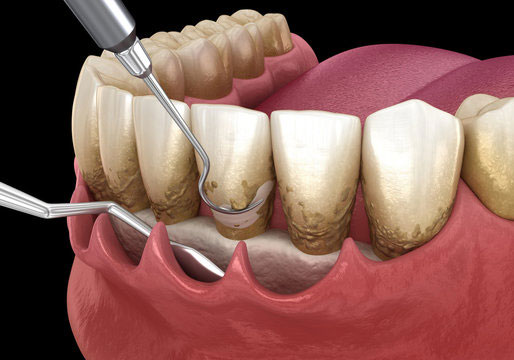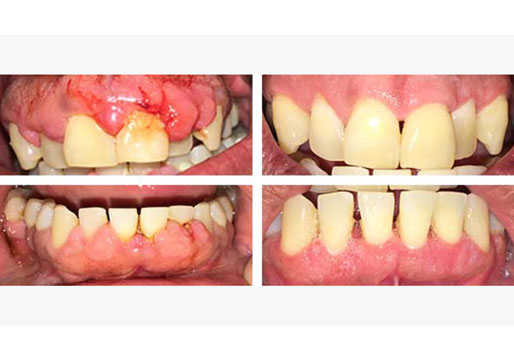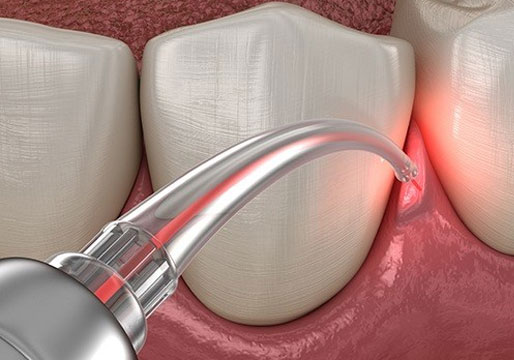Gum Disease
Gum disease is otherwise known as periodontitis, it is the infection in the gums caused by microbes and this infection affects the gums and the bone surrounding the teeth. The infection will slowly lead to tooth loss if unattained. There are various types of gum treatment for various stages of gum disease.
what causes gum disease?
- The cause of gum disease is poor oral hygiene and maintenance. The gum disease can be easily controlled by regular brushing(twice a day), flossing, mouth rinse with mouth wash, eating healthy food, and regular visit to your dentist.
- Poor oral hygiene allows bacterial accumulation in the form of dental plaque.
- Diabetes induces periodontitis.
- Smoking.
- Genetic.
- Conditions that cause decreased immunity, such as leukemia, HIV/AIDS, and cancer treatment.
Signs and Symptoms
The signs of periodontal disease can be divided into mild, moderate, and severe.
In mild cases, the signs may be initiated with gum bleeding on brushing and redness around the teeth on the gums, this stage will progress on its own and maintaining dental hygiene will also help in slow progress.
In moderate cases, there will be severe gingival bleeding, bleeding on biting or chewing food, halitosis or bad breath, swollen gums, itchy gums, the deep pocket between teeth and gums, and mild shaking of teeth may be visible.
In severe cases, extreme halitosis, the gums may be purplish due to loss of oxygen supply, puss discharged from that tooth or segment of teeth, extreme bone loss surrounds the tooth/teeth, severe tooth movement, on spot bleeding. This is how a severe gum disease looks like.
Gum disease associated condition:
The periodontitis is clinically proven and associated with many other general conditions like:
- Stroke
- Atherosclerosis
- Myocardial infarction or heart attack
- Hypertension
How to get rid of gum disease(treatment)?
The treatment is decided with the loss of attachment of gums to the teeth and bone.
Gum disease can be reversed easily if diagnosed earlier, in the mild condition the there is 1-2mm of attachment loss, a simple tooth cleaning with ultrasonic scalers at your dental office will be helpful along with regular maintenance of oral hygiene. In most of the cases, the gingivitis will be reversed and simple home remedies like applying salt or turmeric over teeth can be done.
What is Ayurvedic home remedies for gum disease?
- Chewing neem twig.
- Rubbing oil and salt mixture around the gums.
- Oil pulling, it's one of the most effective ways to maintain good oral hygiene. This can be done with gingelly oil or coconut oil.
- Mouth rinse with the decoction of Triphala or Yashtimadhu.
In moderate cases the attachment loss is 3-4mm, scaling and root planing(SRP), FLAP or LANAP will help in controlling the infection
In severe cases, the attachment loss is more than 5mm, FLAP, or LANAP along with the extraction of severely shaking teeth.
What is SRP?
Scaling and root planning in short known as SRP, it's a deep cleaning of the tooth. The normal dental scaling helps in the removal of a bacterial film known as plaque, this plaque is made up of bacterial matrix that sticks to your tooth firmly as they progress into your gums towards the bone catching those tooth.
The plaque forms a pocket in the gums and this causes an itchy sensation on the tooth, making you prick with pins, toothpicks, etc.
SRP is done by reflecting the gums from teeth and cleaning deeply in the pocket, this can be done with conventional instruments and LASER.
After SRP, we generally place medication inside (doxycycline) or leave it empty depending on the infection and let it heal for a few days.
There will be pain and sensitivity in the tooth for which we will prescribe medication and mouth wash for you.
The procedure is completely painless as it's done under local anesthesia.
Scaling and root planning cost?
In India scaling and root planning cost ranges from 3000Rs. To 5000Rs. for a single tooth. This will also differ from conventional technique and LASER.
Scaling and root planning aftercare?
Regular oral hygiene maintenance, brushing twice a day, mouthwash, gum astringent, and visit your dentist once in 6 months is mandatory.
How long do scaling and root planing take?
The procedure will take approximately 10-20 mins for single teeth and 15-30mins for an entire quadrant.
There are few risks involved in scaling and root planning, If you are hypertensive its always better to go with LASER than conventional as the conventional technique may allow excessive bleeding.
Healing may be delayed in case of diabetes.
What is Flap surgery?
Flap Surgery is done when the gum disease has damaged the bone that holds the tooth. When the infection is severe and cannot be controlled with SRP flap surgery is done, this surgery not only removes the plaque but also the dead tissues are known as granulation tissue.
In the surgery, the gums are completely reflected from teeth, granulation tissues, plaque, and debris are removed from the tooth. A disinfectant medicine is placed over the bone and suture is done.
After surgery protocols
It takes time to heal from flap surgery and do follow every instruction that we give to you.
- Take on prescribed painkillers.
- For 24 hours, you should gently rinse your mouth several times with warm salt water to reduce swelling and soothe the pain.
- Replace the gauze pads until they are blood-soaked.
- Relax after surgery. Strenuous exercise can increase bleeding.
- Eat any soft foods like jelly, pasta, or light soup. Gradually add solid food to your diet while the area is healing.
- Don't lie flat. This could induce bleeding.
- Continue brushing your teeth and your tongue with care.
- To relieve pain and swelling, add an ice or cold compress to the outside of your mouth.
- Do not use biting movements, for example by using a drinking straw.
- Only don't smoke.
How much does dental flap surgery cost?
Dental flap surgery in India will cost approximately 5000Rs. To 17,000Rs per quadrant depending on the severity.
Types of dental flap surgery?
There are two types of flap surgery, conventional and LASER which is known as LANAP.
What is LANAP?
Laser-Assisted New Attachment Procedure(LANAP), this procedure is widely used by dentists because it is the only procedure that passed FDA(Food and Drug Administration) clearance for producing new cementum, new periodontal ligament, and new alveolar bone, which are required for normal oral function.
The treatment is very effective in medically compromised patients like Hypertension, cardiac patients, and diabetes.
Advantages of LANAP:
- Reduced or nil usage of grafts, since own body tissue is regenerated.
- Gum tissue stays intact because there is not cut on gums involved.
- LASER helps in faster healing, so healing time is doubled.
- Pain is very less after the procedure.
- No cutting hence no stitching is involved.

Flap Procedures

Gingivectomy and Curettage with Crown Lengthening

